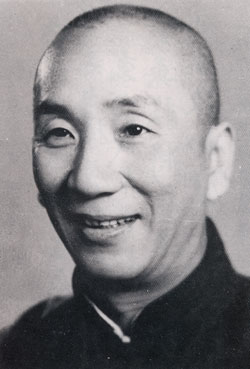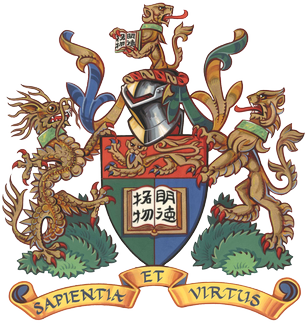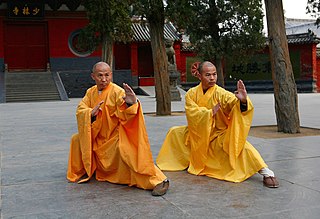
Ip Man, also known as Yip Man, was a Chinese martial arts grandmaster. He became a teacher of the martial art of Wing Chun when he was 20. He had several students who later became martial arts masters in their own right, the most famous among them being Bruce Lee.

Education in Hong Kong used to be largely modelled on that of the United Kingdom, particularly the English system. Since 2012, the overhaul of secondary school diploma has introduced changes to the number of school years as well as the two-tier general examinations. The DSE has replaced the old HKCEE and the A-levels. Education policy in Hong Kong is overseen by the Education Bureau and the Social Welfare Department.

The University of Hong Kong (HKU) is a public research university in Pokfulam, Hong Kong. It was founded in 1887 as the Hong Kong College of Medicine for Chinese by the London Missionary Society and formally established as the University of Hong Kong in 1911. It is the oldest tertiary institution in Hong Kong.

Hung Ga Kuen (Cantonese) or Hongjiaquan (Mandarin) - alternatively shortened as either Hung Ga (洪家) or Hung Kuen (洪拳) - is an ancient southern Chinese martial art, which roots lie in the Southern Shaolin kung fu. During the turn of the 3rd millennium, Hung Ga was one of the most widely practiced styles of kung fu from southern China in the world.

Cantonese opera is one of the major categories in Chinese opera, originating in southern China's Guangdong Province. It is popular in Guangdong, Guangxi, Hong Kong, Macau and among Chinese communities in Southeast Asia. Like all versions of Chinese opera, it is a traditional Chinese art form, involving music, singing, martial arts, acrobatics, and acting.

An art school is an educational institution with a primary focus on practice and related theory in the visual arts and design. This includes fine art – especially illustration, painting, contemporary art, sculpture, and graphic design. They may be independent or operate within a larger institution, such as a university. Some may be associated with an art museum.

The Hong Kong Academy for Performing Arts (HKAPA) is a provider of tertiary education in Hong Kong. Located near the north coast of Wan Chai on Hong Kong Island, the main campus also functions as a venue for performances. Bethanie, which is the site of the institution's Landmark Heritage Campus in Pok Fu Lam, has housed the School of Film and Television since 2007.

Ying Wa Girls' School is a HKCCCC secondary day school for girls in Mid-Levels, in Hong Kong. The campus is located at 76 Robinson Road, Mid-levels. The enrolment currently stands at slightly under 1,000 students. It is one of the 22 Grant Schools in Hong Kong. Ying Wa Girls' School is a selective secondary school and its graduates are known for their distinguished performances at public examinations. The current Principal of the School is Mr. Francis Kwan. He succeeded Mrs. Ruth Lee as the Principal in 2015.
Sacred Heart Canossian College is a Catholic, all-girls' school established at Robinson and Caine Roads, Mid-Levels, Hong Kong. Founded in 1860, the school currently serves under 2,000 students and has been identified as one of the most prestigious schools in Hong Kong.
Kung fu film is a subgenre of martial arts films and Hong Kong action cinema set in the contemporary period and featuring realistic martial arts. It lacks the fantasy elements seen in wuxia, a related martial arts genre that uses historical settings based on ancient China. Swordplay is also less common in kung-fu films than in wuxia and fighting is done through unarmed combat.

Jockey Club Ti-I College is a secondary school in Fo Tan, Hong Kong. The setting up of Ti-I College, which is not only focused on normal academic curriculum, but also aimed to develop students' potential of visual arts and sports, was proposed by Sir Edward Youde, the late governor of Hong Kong.
Chan Sau Chung 陳秀中, The Monkey King was the Head of the Tai Shing Pek Kwar Kung Fu. He was the protégé and sole successor of Gan Dak Hoi, of Tai Shing Pek Kwar Kung Fu. His notable students include movie actor/martial artist Chen Kuan-tai, who is famous for wuxia and martial arts movies made by the Shaw Brothers.

Lai Tung Pai, is a martial art of Chinese origin, coming from the Siu Lahm tradition in the Guangdong providence of China. The art was developed at the Henan Siu Lahm Temple and then was moved to the Hoi Tong Monastery in Guangdong when the former was burned down during the Qing dynasty. The dates are not certain, as the only living person, Kong Hoi, studied at the Hoi Tong Monastery in the early 20th century, but it is believed the style originated in the early 1600s. Grandmaster Kong is a member of the Hong Kong Chinese Martial Art Association, now named the Hong Kong Chinese Martial Arts Dragon and Lion Dancing Association Ltd.

Choy Lee Fut is a Chinese martial art and wushu style, founded in 1836 by Chan Heung (陳享). Choy Li Fut was named to honor the Buddhist monk Choy Fook who taught him Choy Gar, and Li Yau-san (李友山) who taught him Li Gar, plus his uncle Chan Yuen-wu (陳遠護), who taught him Hung Kuen, and developed to honor the Buddha and the Shaolin roots of the system.

Cheung Ah-yim ; b. 1824–d. 1893) a.k.a.Jeung Yim, Cheung Yim, Cheung Hung-sing, Jeong Hung-sing, Jeong Hong-sing, Zhang Yan, Zhang Hongsheng; is recognized as an important contributor (co-founder) to the expansion of Choy Lee Fut - a Southern Chinese martial arts system, and was the most famous of Chan Heung's disciple to emerge from the Choy Lee Fut System.

Dong Yingjie was a leading master of tai chi, and a top disciple of Yang Chengfu. Born in Renze, Xingtai, Hebei, China, his given name was Wenke (文科). Famous in his time for defeating a foreign boxer in a public challenge match, he dedicated his life to the martial arts, training intensively in multiple styles, serving as chief assistant instructor for Yang Chengfu, and going on to found his own thriving tai chi legacy.

The Confidant is a Hong Kong biographical fiction television drama produced by TVB under executive producer Marco Law, and stars Michelle Yim as Empress Dowager Cixi, and Wayne Lai as imperial eunuch Li Lianying. The drama depicts how a group of eunuchs survive in the weakening Qing empire, and closely traces Li's early life from the first day he entered the imperial palace to becoming one of the most powerful political figures in the latter years of the Qing Dynasty. The drama also follows Li's relationship with Cixi, and how he eventually becomes her closest confidant.

The Incredible Kung Fu Master, also known as The Kung Fu Master is a 1979 martial arts action comedy film directed by Joe Cheung in his directorial debut and starring Sammo Hung and Stephen Tung, the latter in his first leading role. This film features an action direction from a number of famous action directors including Sammo Hung Stunt Team, Lam Ching-ying, Billy Chan, Bryan Leung and Yuen Biao.

Hong Kong College of Technology is a non-profit-making educational institution under HKCT group. Founded in 1947 as Workers’ Night School, HKCT has been dedicated to the development of vocational and professional education for over 75 years. It offers a diverse ranged of vocational-specific programmes catering to individuals of different ages, backgrounds, and social strata, with the aim of progressing towards becoming a leading Vocational and Professional Education and Training (VPET) university.

The Department of Fine Arts of the Faculty of Arts, Chinese University of Hong Kong, was founded in 1957 as part of New Asia College.














